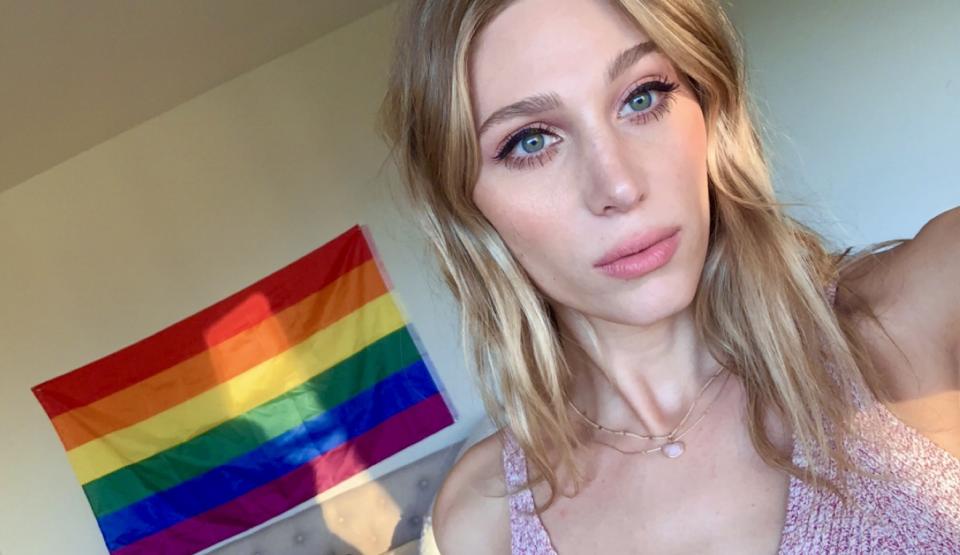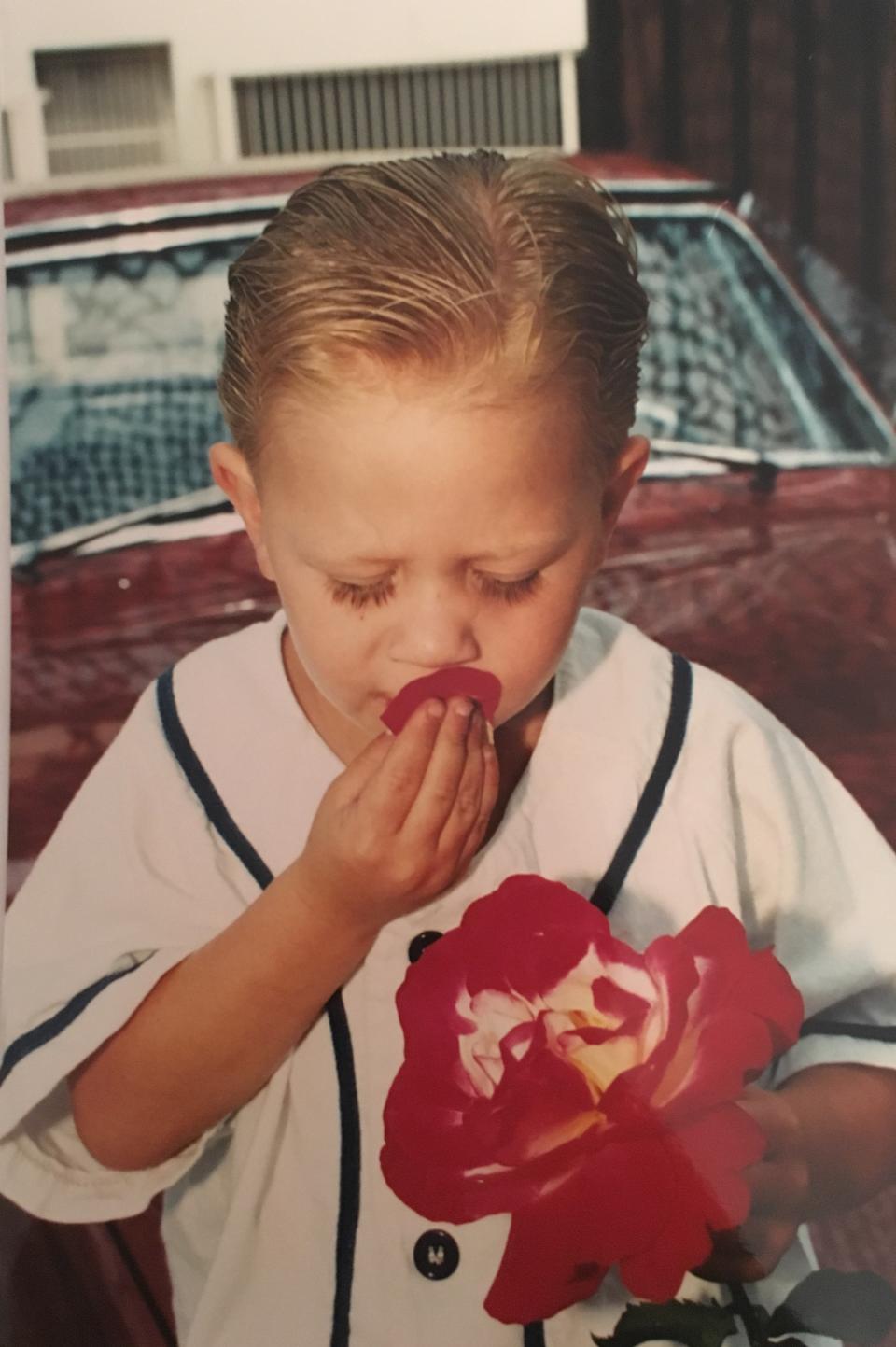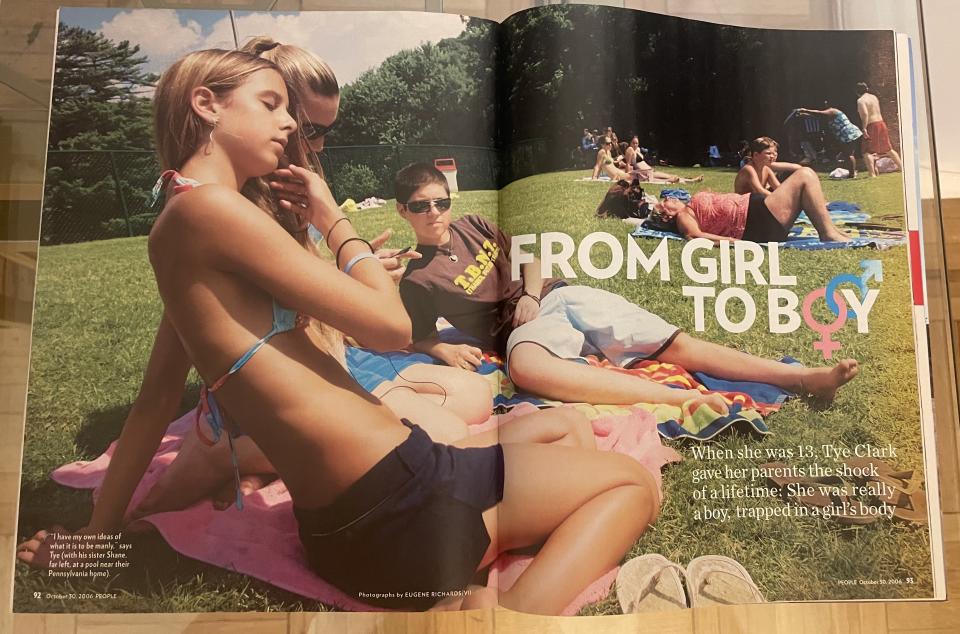This Pride, I’m Choosing to Focus on Trans Joy

I first learned of the term transgender in 2006, when, during career day around age 12, I stumbled upon a People article about a transitioning trans-male teen who was assigned female at birth. Back then, media coverage of trans individuals was rarely positive, as trans people were talked about through invalidating, derogatory language. But when I read that word, “transgender,” I immediately knew it defined how I’d felt my entire life.
I was born transgender and although I knew people perceived me differently than I perceived myself, I hadn’t discovered language that perfectly captured my experience until I read that article. Until that point, I thought I was the only person on the planet that felt the way I did—“trapped in the wrong body,” as the teen in the article had described. I was so naturally feminine, always one of the girls, but no one saw me that way. I thought if I told anyone about my identity, I’d be sent for psychological evaluation.
More from StyleCaster
NYC Pride 2023: Where to Sip, Twirl, & Have the Most Celebratory Time
70 (!!) Fashion, Beauty & Lifestyle Brands With Pride Collections That Give Back
A few days after discovering the article, I coyly showed it to my mom and told her I wanted to be a girl. She accepted me, no questions asked, but it took her a while to find a mental health professional who would take me on as a client. Those next few years were tough. Even with my mom’s unwavering support, I knew I wasn’t living how I was meant to. I felt helpless, like the weight of the world was crushing me.

In 2009, during the fall of my junior year of high school, my mom asked if I wanted to start wearing her clothes. I was so happy. That moment is what I consider to be the start of my transition. A few months later, we finally found a therapist, Dr. Margie Nichols, who would see a trans kid. Nichols told me that if I wanted to transition and be “cis-passing,” I should get on hormone blockers ASAP; doing so would give me time to decide what I wanted to do with my body without going through puberty right away. Soon after, my mom found an endocrinologist and surgeon to help me with my transition. I wouldn’t be here without gender-affirming care.
I am proof that trans people can be happy and wonderful members of society with the right support.
Click here to read the full article.
Contrary to popular belief, hormone blockers are reversible. Once I was living as a woman for a year, I started estrogen, which isn’t as reversible as blockers. Because I had given myself time to think about transitioning on my terms, I stopped male puberty in its tracks and was able to go through a female puberty and transition the exact way I wanted to. Finally, I felt like the woman I always saw myself as.
After my freshman year of college at Hofstra University in 2012, I had sexual reassignment surgery, a dream come true that made me feel complete. Soon after, my life went into overdrive. I lost my virginity, studied abroad in Amsterdam, graduated college, worked in N.Y.C., dated hot and successful guys, moved to L.A., and eventually fell in love. To this day, I’m astounded that my life has turned out the way I always fantasized it would. I sometimes reflect on “little Corey” and how proud she must be of me. I am my own dream come true. And this is exactly why kids should have the right to choose what to do with their own bodies.

Of course, my transition didn’t come without hiccups. In high school, I found bullies in judgmental, disapproving parents, mean girls and boys who were discomforted by my existence, and school board members who tried to stop me from using the women’s locker room and bathrooms. Still, though, school was a safe space for me. My vice principal, a woman, fought for me to be as comfortable as possible, facilitating meetings between my therapist, family, and faculty to educate them on transness and the proper use of pronouns. Together, we defeated the tough school board, proving to them that my transition wasn’t “a phase.”
Back then, there were no laws or institutional language that prevented me from using my desired bathroom or choosing to be on a sports team (not that I wanted to join one, but the option was there). There were no bans on LGBTQ+ books and there were no crude politicians making a circus of trans existence. Harmful attacks on the trans community weren’t heavily reported in the mainstream media. I was able to survive, thrive, and succeed.
I am proof that trans people can be happy and wonderful members of society with the right support. I was able to transition because my mom fought for me, and my school’s administration was willing to educate themselves, their staff, and students about trans identity. No, we’re not “trapped in the wrong body”—we are real and valid. Visibility is especially key, but acceptance, support from our allies is crucial.

It’s a dangerous world for the LGBTQ+ community, especially transgender individuals. According to the Human Rights Campaign, there are over 520 anti-LGBTQ+ bills that have been introduced in state legislatures in 2023 alone. Over 220 of those bills specifically target transgender and non-binary people, and 70 anti-LGBTQ+ laws have been enacted so far this year, a sign that the fight for equality is far from over.
In addition, there are unnecessary book bans in schools, not to mention laws against using the word gay in some states. These attacks have dangerous repercussions, and trans people (and their families) will be afraid to own their truth and live loudly. Amid so much hate, we need positivity to uplift the trans community and to shed light on the amazing things that can happen when trans people have the right to make decisions about their education and their bodies. I hope to be an example of trans joy.
So, how can you support trans lives? Start small. Deliver essentials to a local LGBTQ+ shelter, and donate to organizations like GLAAD, It Gets Better, and The Trevor Project, all of which provide helpful resources for becoming a better ally. Shop from brands that give back to the LGBTQ+ community. And most importantly, vote. Your civic duty matters.
Pride Month is a beautiful time for members of the LGBTQ+ community to gather with their family and celebrate individuality, but it’s also an opportunity for allies to stand up and speak out with us—and for us. To my trans family out there, know that there are people fighting for you, that love you, and that want you to succeed. Happy Pride!
Best of StyleCaster

